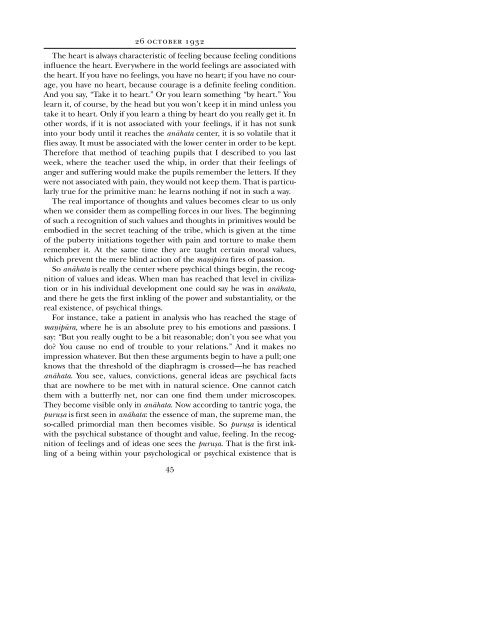CG JUNG - Countryside Anarchist
CG JUNG - Countryside Anarchist
CG JUNG - Countryside Anarchist
Create successful ePaper yourself
Turn your PDF publications into a flip-book with our unique Google optimized e-Paper software.
26 OCTOBER 1932<br />
The heart is always characteristic of feeling because feeling conditions<br />
influence the heart. Everywhere in the world feelings are associated with<br />
the heart. If you have no feelings, you have no heart; if you have no courage,<br />
you have no heart, because courage is a definite feeling condition.<br />
And you say, “Take it to heart.” Or you learn something “by heart.” You<br />
learn it, of course, by the head but you won’t keep it in mind unless you<br />
take it to heart. Only if you learn a thing by heart do you really get it. In<br />
other words, if it is not associated with your feelings, if it has not sunk<br />
into your body until it reaches the anvhata center, it is so volatile that it<br />
flies away. It must be associated with the lower center in order to be kept.<br />
Therefore that method of teaching pupils that I described to you last<br />
week, where the teacher used the whip, in order that their feelings of<br />
anger and suffering would make the pupils remember the letters. If they<br />
were not associated with pain, they would not keep them. That is particularly<br />
true for the primitive man: he learns nothing if not in such a way.<br />
The real importance of thoughts and values becomes clear to us only<br />
when we consider them as compelling forces in our lives. The beginning<br />
of such a recognition of such values and thoughts in primitives would be<br />
embodied in the secret teaching of the tribe, which is given at the time<br />
of the puberty initiations together with pain and torture to make them<br />
remember it. At the same time they are taught certain moral values,<br />
which prevent the mere blind action of the maõipÖra fires of passion.<br />
So anvhata is really the center where psychical things begin, the recognition<br />
of values and ideas. When man has reached that level in civilization<br />
or in his individual development one could say he was in anvhata,<br />
and there he gets the first inkling of the power and substantiality, or the<br />
real existence, of psychical things.<br />
For instance, take a patient in analysis who has reached the stage of<br />
maõipÖra, where he is an absolute prey to his emotions and passions. I<br />
say: “But you really ought to be a bit reasonable; don’t you see what you<br />
do? You cause no end of trouble to your relations.” And it makes no<br />
impression whatever. But then these arguments begin to have a pull; one<br />
knows that the threshold of the diaphragm is crossed—he has reached<br />
anvhata. You see, values, convictions, general ideas are psychical facts<br />
that are nowhere to be met with in natural science. One cannot catch<br />
them with a butterfly net, nor can one find them under microscopes.<br />
They become visible only in anvhata. Now according to tantric yoga, the<br />
puruüa is first seen in anvhata: the essence of man, the supreme man, the<br />
so-called primordial man then becomes visible. So puruüa is identical<br />
with the psychical substance of thought and value, feeling. In the recognition<br />
of feelings and of ideas one sees the puruüa. That is the first inkling<br />
of a being within your psychological or psychical existence that is<br />
45


